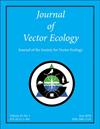人工血餐中抗凝血剂对致倦库蚊和埃及伊蚊死亡率、繁殖力和生育能力的影响
IF 1.3
3区 农林科学
Q2 ENTOMOLOGY
引用次数: 4
摘要
摘要:用于昆虫群落的血液来源及其对繁殖力和生育能力的影响已经在多种蚊子中进行了研究,但防止血液凝结的抗凝血剂的作用却很少受到关注。在这里,我们确定了两种抗凝剂对致倦库蚊(Sebring和BCS菌株)和埃及伊蚊Liverpool的死亡率、繁殖力和生育能力的影响。每种蚊子都接受了三种治疗中的一种:直接喂食活鸡(LC)、用肝素(EXS)处理的新鲜放血鸡的血液或用Alsever溶液(ART)处理的商业购买的鸡血。未观察到治疗对死亡率的显著影响。致倦库蚊Sebring和BCS菌株均表现出处理类型对繁殖力的显著影响,LC的产卵量是EXS的1.40倍,是ART的2.14倍。对于BCS菌株蚊子,LC比ART高1.55倍,EXS比ART高1.507倍,但LC和EXS之间没有显著差异。对于埃及伊蚊,LC和ART处理的平均产卵量只有显著差异,LC多产卵1.46倍。在任何治疗的蚊子中都没有观察到对生育能力的显著影响。这些结果表明抗凝血剂对多种蚊子类群的繁殖力有负面影响。这可能会影响实验室生产大量蚊子或在野生蚊子种群中定居的能力,在考虑群落维持或媒介生物学研究时应予以考虑。本文章由计算机程序翻译,如有差异,请以英文原文为准。
The effect of anticoagulants in artificial blood meals on the mortality, fecundity, and fertility of Culex quinquefasciatus and Aedes aegypti (Culicidae)
ABSTRACT: Blood sources used for insect colonies and their effects on fecundity and fertility have been studied in multiple mosquito species, but the effect of anticoagulants that prevent clotting of blood has received minimal attention. Here, we identify the effect two anticoagulants have on the mortality, fecundity, and fertility of Culex quinquefasciatus (Sebring and BCS strains) and Aedes aegypti Liverpool. Each mosquito species was provided with one of three treatments: direct feeding on live chicken (LC), blood from freshly exsanguinated chicken treated with heparin (EXS) or commercially purchased chicken blood treated with Alsever's solution (ART). No significant effect of treatment on mortality was observed. Both Cx. quinquefasciatus Sebring and BCS strains demonstrated a significant effect of treatment type on fecundity with the number of eggs laid for LC being 1.40-fold higher than EXS and 2.14-fold higher than ART for Sebring. For BCS strain mosquitoes, LC was 1.55-fold higher than ART, and EXS was 1.57-fold higher than ART, but there was no significant difference between LC and EXS. For Ae. aegypti mosquitoes, only a significant difference in mean egg counts was observed between LC and ART treatments, with LC laying 1.46-fold more eggs. No significant effect on fertility was observed among any mosquitoes for any treatment. These results demonstrate the negative effect of anticoagulants on the fecundity for multiple mosquito taxa. This may affect the ability of labs to produce large numbers of mosquitoes or colonize wild mosquito populations and should be taken into account when considering colony maintenance or vector biology research.
求助全文
通过发布文献求助,成功后即可免费获取论文全文。
去求助
来源期刊

Journal of Vector Ecology
生物-昆虫学
CiteScore
2.60
自引率
5.90%
发文量
31
审稿时长
6-12 weeks
期刊介绍:
The Journal of Vector Ecology is an international journal published by the Society for Vector Ecology. It is concerned with all aspects of the biology, ecology, and control of arthropod and vertebrate vectors and the interrelationships between the vectors and the agents of disease that they transmit. The journal publishes original research articles and scientific notes, as well as comprehensive reviews of vector biology based on presentations at Society meetings. All papers are reviewed by at least two qualified scientists who recommend their suitability for publication. Acceptance of manuscripts is based on their scientific merit and is the final decision of the editor, but these decisions may be appealed to the editorial board. The journal began publishing in 1974 and now publishes on-line only.
 求助内容:
求助内容: 应助结果提醒方式:
应助结果提醒方式:


